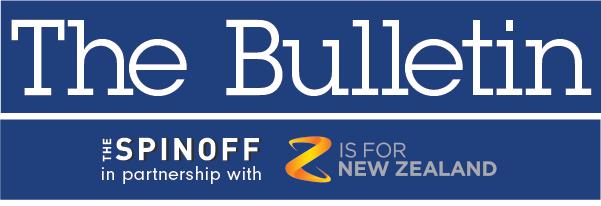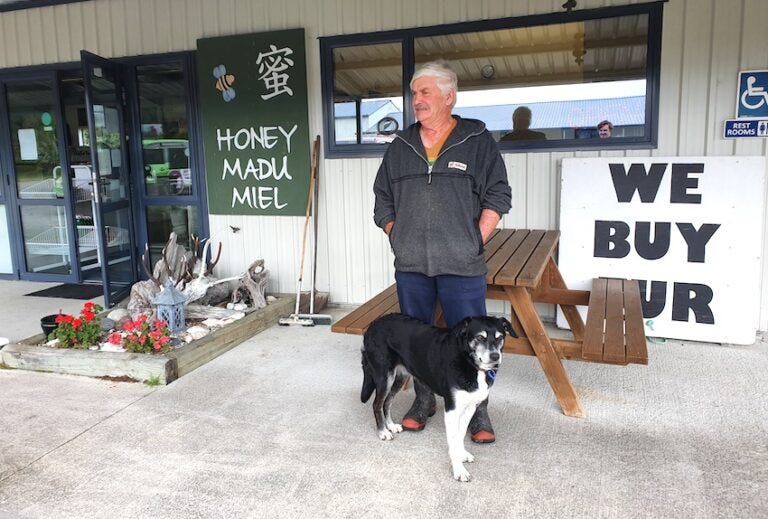Minor parties push for scarce positions
They know places are limited, and that they just can't all make it in

Good morning and welcome to The Bulletin for Friday 9 October, by Alex Braae for The Spinoff. Presented in partnership with Z Energy.
In today’s edition: Minor parties push for positions, Gisborne beneficiary advocates raise alarm on emergency housing, and name suppression continues for NZ First Foundation accused

Image: The five chaps who took part in the TVNZ minor party debate (Credit: One News)
Last night's TVNZ minor party debate was preceded by a poll which shows most are under serious pressure. First of all, the poll: The One News Colmar Brunton survey showed Labour continue to enjoy a vast lead over National, which showed little sign of closing in this particular poll. A full half the country prefer Jacinda Ardern as PM, compared to just under a quarter for National's Judith Collins. For the purposes of the minor parties, that matters, but an almost more important number is 79% – that's the share of the vote the two major parties enjoy right now, leaving very little left to play for.
Among the minors, Act has emerged as the clear leader. With 8% in the poll, and the safety of leader David Seymour's Epsom seat, they look assured of getting back into parliament. Their best shot at being in government basically depends on it only being a 3-party parliament, and Labour falling back a bit. The Greens are on 6%, and if they stay above the 5% threshold a Labour government is basically assured. But there are no guarantees for the Greens, who have hovered around that level all year. Incidentally, the poll also showed that most of those asked feel the MMP threshold is in the right place – and of those who wanted a change, more wanted it to be made higher rather than lower.
For the others, NZ First rose up to 2.4%, which could be a bit of noise, or it could be a sign that the classic Winston surge is finally happening. The Opportunities Party is also up to 2%, with much less media oxygen to work with, and no place on the debate stage. The New Conservatives and Advance NZ are both stuck at 1% each, while the Māori Party's party vote share fell to just 0.2%. For them, the only path in is to win an electorate – the only places there might be an upset appear to be Waiariki and Te Tai Hauāuru. And for Advance NZ, their hopes of co-leader Billy Te Kahika winning Te Tai Tokerau appear to be totally unrealistic – a Te Ao News poll last night showed him at just 1% in the seat.
As for the debate itself, there was a palpable sense of striving among pretty much all five of the men on stage. TVNZ's political editor Jessica Mutch-McKay had a tough job trying to keep them all behaving and not all talking over each other, while also keeping the debate moving and preventing long waffling answers and repetition. This analysis by Radio NZ's Russell Palmer I think about summed it up. The whole thing was also recapped by One News. As for a verdict on who won, my guess is the answer is probably Labour, as there's a good chance the whole spectacle turned off more potential voters than it convinced.
Beneficiary advocates on the East Coast are raising the alarm about the supply of emergency housing running out, reports the Gisborne Herald. It hasn't happened overnight, but it has now got to the point where all providers are full up, and the waiting list continues to grow. Long term, more homes will need to be built, but it's also an immediate problem.
Name suppression will continue for the two people charged in relation to the NZ First Foundation, reports Stuff. Those accused are not current MPs, office holders or members of the party. We also got more detail about what exactly the allegations are – effectively, the pair are accused of trying to deceive either or both of the NZ First party secretary, and the Electoral Commission. Donations intended for the party ended up being funneled into NZFF accounts, "to use as the defendants saw fit, and were used to pay expenses of the party and to develop a fundraising database for the benefit of the party and [suppressed].”
There's been a lot of discussion in education this week about a new NZ Initiative report, which heavily criticises the trend in NZ schools towards 'child-centric' learning. Newsroom's Laura Walters has reported on the think-tank's suggestions, particularly the idea that schools should return to teaching specific knowledge, rather than skills and competencies. On The Spinoff, we've published a scathing counter-argument from Auckland principal Claire Amos, who says (to simplify) schools are preparing kids for uncertain futures, and as such the skills are more valuable than specific pieces of knowledge.
You're probably reasonably sick at this stage about all the talk of fiscal holes and so on, given how many have been claimed. Fortunately Stuff's Thomas Coughlan has put together something of a last word on the subject, explaining what the difference between the various parties on this has been. Either way, it's probably worth remembering that the economic situation is currently extremely volatile, and these budgets are unlikely to survive much contact with the next couple of years of reality.
Mana whenua voting rights around the Wellington City Council table have got closer, reports the NZ Herald's Georgina Campbell. The council has voted to investigate the concept, particularly the legal and logistical steps around it. The vote was unanimous, and mayor Andy Foster was paraphrased as saying "the council has a legal obligation to provide opportunities for Māori to contribute to decision making processes", it was just a matter of figuring out how best to do that.
An excellent interactive feature on the experience of Recognised Seasonal Employer workers from the start of Covid-19 onwards: Stuff's Tony Wall has started with the previously canvassed story of Anthony Rarere, who is alleged to have used intimidatory tactics and pay withholding against workers from the Solomon Islands. It then takes a wider look at how the scheme is a huge benefit for employers, but the gains don't necessarily filter down to those actually picking the fruit, who often have little protection.
Just quickly – the election information website Policy was already great. But now if anything, it's even greater. They've just gone and added a whole lot of information about the referendums as well, so you can quickly and easily get what you need to make an informed decision. Read more about it here.
Got some feedback about The Bulletin, or anything in the news?
Drop us a line at thebulletin@thespinoff.co.nz

Right now on The Spinoff: The Side Eye returns with a lesson on how to draw James Shaw and Marama Davidson. Sam Brooks reviews the memoir of singer Stan Walker, a remarkable human being who has overcome immense difficulties, and for whom the description 'singer' barely scratches the surface. Angela Clifford argues that we need to plan now for the future of New Zealand's food systems. Leonie Hayden gives a two-minute wrap of te ao Māori policies. Josie Adams explains the latest moves by Facebook against the Q-Anon conspiracy that has spread across the platform. Brent Melville asks why real estate agencies are clinging on to wage subsidy payments despite a booming market.
And my latest road piece: The research for this one actually took place a few weeks ago, when I was driving down the West Coast. As a tourist of sorts, I wrote about the immense feeling of emptiness there right now, the difficult battle for survival many are having with the borders closed, and the ideas that are being put forward to meet the challenges of the future.
For a feature today, an incredible profile of a person who was very famous, but you probably haven't thought much about them recently. The Ringer has looked at the rise and fall of Vanilla Ice, a polarising music industry figure who wasn't necessarily destined to be the punchline that he ended up as. Here's an excerpt:
It’s bizarre to consider that barely a year before becoming a cultural piñata, Ice was a certified South Dallas club phenomenon with the cosign of Chuck D and Ice-T, rhyming over beats from Mac Dre’s producer on one of the most respected independent hip-hop labels. But this was a distinctly different image of Vanilla Ice from the one about to become ludicrously famous, the one rocking shiny suits and parachute pants. Released in late 1989, the cover of Hooked finds Ice crouched on chunks of fake ice, throwing up the set in white jeans, a beeper, and a pink crew neck sweater—predating Killa Cam’s wardrobe by a good dozen years. Behind him, a naked blond throws her head back seductively. He looks like a cocaine-trafficking rapper who Crockett and Tubbs are trying to catch.
“He had a charisma that you don’t see very often,” says John Abbey, the founder of Ichiban, who also helped A&R Hooked. “He was very confident, extremely polite, and had an angle that you didn’t see anyone else doing. It was that simple.” Except that initially it failed.
A blow for the England netball team, who will travel to New Zealand to play the Silver Ferns without their coach. The NZ Herald reports head coach Jess Thirlby has tested positive, and is now self-isolating despite not being symptomatic. All other players and management have tested negative before departure, and besides – they'll also have to do the mandatory two weeks in New Zealand. After three days of self-isolation in quarantine, England players will be able to train together, provided the whole team again tests negative.
That's it for The Bulletin. If you want to support the work we do at The Spinoff, please check out our membership programme




